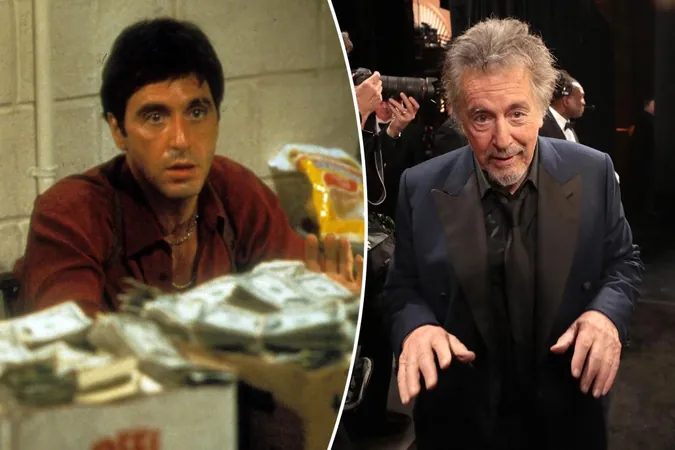
Al Pacino’s Rollercoaster Financial Journey: From Iconic Wealth to Unbelievable Overspending!
2024-10-15
Author: Yan
Introduction
In a shocking twist of fate, Al Pacino, the legendary actor behind iconic roles in films like "The Godfather," found himself in dire financial straits during the mid-1980s, a revelation he candidly shares in his new memoir, "Sonny Boy."
Early Career Struggles
Despite his immense critical acclaim and box office success, with "The Godfather" grossing over $250 million, Pacino's financial compensation was a mere $35,000—far from what one might expect. Reflecting on his early career, he notes, "When I finished making 'The Godfather,' I was broke, not that I had ever had any money, but now I owed money." With a lifestyle that included maintaining a country home and supporting his expenses, he realized he had a lifestyle that was unsustainable given his limited income from acting—only five films throughout the entire 1980s.
Acknowledging Poor Financial Decisions
Pacino acknowledges his poor financial decisions, stating that he may have been taken advantage of by others. "I could blame my accountants or my manager... but I’d have to take responsibility for my own actions," he admits. The moment when Diane Keaton vehemently defended him during a meeting about finances serves as a pivotal point in his realization about the importance of money management.
Return to the Screen and Financial Challenges
Encouraged by Keaton, Pacino eventually returned to the screen in the 1989 film "Sea of Love," which was both critically acclaimed and a box office hit. While he worked more frequently afterward, including returning as Michael Corleone in "The Godfather: Part III," he still faced financial challenges. Pacino's struggles weren’t just from a lack of work; extravagant spending habits became a major issue.
Extravagant Lifestyle and Financial Ruin
By the early 2000s, after relocating to Los Angeles, Pacino's lifestyle became even more lavish, costing him roughly $400,000 a month to maintain his properties and support his growing family, including his twins Anton and Olivia. However, his financial situation drastically changed when he discovered that his accountant was running a Ponzi scheme. "I had fifty million dollars, and then I had nothing," he wrote, detailing the near-fall from grace he experienced.
Reckless Spending Habits
In a jaw-dropping detail, Pacino recounts the staggering costs associated with his lifestyle—16 cars, 23 cell phones, and even a gardener earning $400,000 annually for maintaining a property he rarely visited! He reflects on his reckless habits, admitting he didn’t even sign his own checks, allowing his accountant to manage his finances without oversight.
Recognition of Financial Reality
As Pacino hit his 70s, he recognized the urgency to adapt to his financial realities. To recover, he restructured his spending and became more strategic about his projects, though he candidly admits that some decisions were driven entirely by the need for money rather than artistic merit. "I ended up doing some really bad films... I sort of knew they were bad, but I convinced myself I could somehow get them up to being mediocre," he wrote.
Reflections on Wealth and Happiness
Ultimately, reflecting on his early career, Pacino credits "Scarface" as being his most financially rewarding role, thanks to the residuals that continue to support him. Now wiser from his financial journey, he stresses the importance of consulting with financial experts as he prepares for the future.
Conclusion
Al Pacino's story serves as a powerful reminder that even some of Hollywood's brightest stars can face significant financial challenges. His journey underscores the importance of financial literacy, wise spending, and the necessity of being proactive in managing one’s wealth, no matter how substantial it may be. It begs the question: Can wealth really bring happiness, or is it all about how you manage it?



 Brasil (PT)
Brasil (PT)
 Canada (EN)
Canada (EN)
 Chile (ES)
Chile (ES)
 España (ES)
España (ES)
 France (FR)
France (FR)
 Hong Kong (EN)
Hong Kong (EN)
 Italia (IT)
Italia (IT)
 日本 (JA)
日本 (JA)
 Magyarország (HU)
Magyarország (HU)
 Norge (NO)
Norge (NO)
 Polska (PL)
Polska (PL)
 Schweiz (DE)
Schweiz (DE)
 Singapore (EN)
Singapore (EN)
 Sverige (SV)
Sverige (SV)
 Suomi (FI)
Suomi (FI)
 Türkiye (TR)
Türkiye (TR)